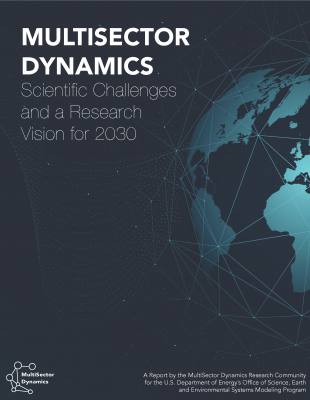Human–Earth Interactions Researchers Set Vision for 2030
Report outlines scientific challenges and future course for MultiSector Dynamics research
As seen almost daily in news reports, tightly connected national and global networks of infrastructure, commodities, goods, and services are vulnerable to failure at all geographic scales. Shocks and stressors can arise from weather and climate hazards as well as societal trends such as changes in population and economic dynamics.
Interdisciplinary researchers across the globe are working to advance human–Earth systems science to better address these interconnected risks, increase resilience, and improve sustainability. In the United States, these efforts are supported in large measure by the MultiSector Dynamics (MSD) area of the Biological and Environmental Research program in the Department of Energy (DOE) Office of Science. The program seeks to improve understanding of risks, synergies, and tradeoffs as humans respond to diverse human pressures that will evolve simultaneously with an increasingly extreme climate.
Supporting 10 independent research projects across DOE laboratories and leading U.S. universities, DOE’s MSD program has recently established a “community of practice” to improve collaboration among MSD researchers both in the United States and internationally. The newly formed group for MSD has just published a new report, co-led by Pacific Northwest National Laboratory, that identifies shared research approaches, questions, and opportunities for the community. The goal is to facilitate progress in managing complex human–Earth system interdependencies. The document outlines a deep and compelling future for the new science of MSD, according to Bob Vallario, MSD program director at the DOE Office of Science.
“The new MSD Vision 2030 report will press the boundaries of integrated modeling, complexity theory, high-performance computing, and machine learning, bringing advanced simulation capabilities and insights to bear on both national challenges and opportunities,” Vallario said. “The scope ranges from climate impacts, population shifts, and aging infrastructure, to technology, resource, and economic development.”

